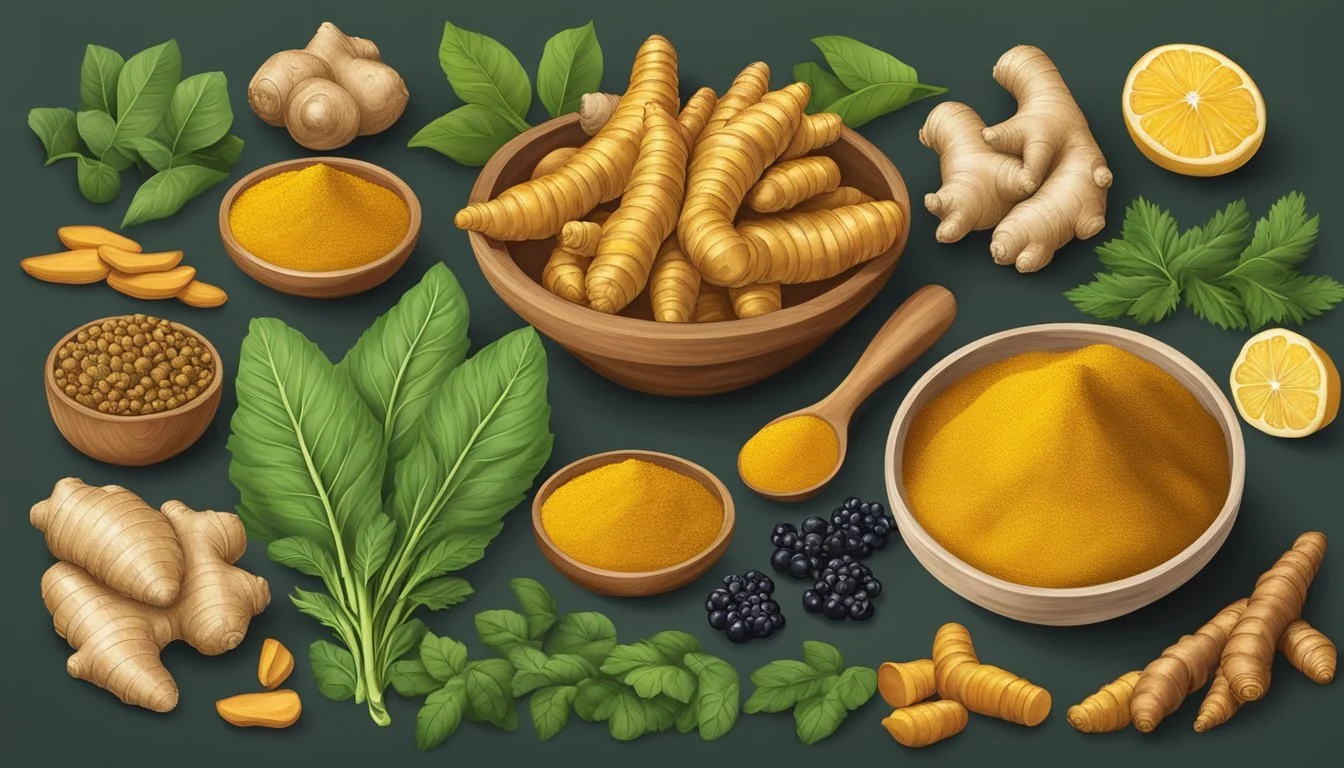Top Foods to Fuel Your Six-Pack Abs Journey
Rosacea is a chronic skin condition that causes redness, pimples, and, in severe cases, thickened skin. It can significantly affect one's self-esteem and quality of life. While there is no cure for rosacea, dietary choices can play a pivotal role in managing the inflammation associated with this condition.
Certain foods have been found to help reduce inflammation and calm rosacea symptoms, providing a natural way to manage flare-ups. This article explores which foods may aid in soothing rosacea-prone skin, as well as which foods to avoid to prevent aggravating the condition.
1) Green Tea
Green tea is often recommended for managing rosacea due to its anti-inflammatory properties. The presence of polyphenols in green tea helps reduce inflammation and can calm the skin.
Studies have shown that green tea can lower the skin's reaction to UV light, which is a known trigger for rosacea flare-ups. The antioxidant components in green tea, such as catechins, provide a soothing effect on irritated skin.
Applying green tea topically may also provide relief. Green tea extract in skin care products can help reduce redness and flushing associated with rosacea.
Individuals with rosacea might benefit from drinking green tea regularly, as it is known to promote overall skin health. Green tea also hydrates the skin, which is essential for those experiencing dryness from rosacea.
In addition to drinking green tea, using skincare products containing green tea extract can offer targeted benefits. Many creams and lotions designed for sensitive skin incorporate green tea for its calming and anti-inflammatory effects.
2) Salmon
Salmon is rich in omega-3 fatty acids, which are known for their anti-inflammatory properties. For individuals with rosacea, incorporating salmon into their diet can help reduce inflammation and potentially calm skin flare-ups.
These omega-3 fats also support overall skin health by maintaining the skin's barrier function. This barrier protection is essential in keeping irritants out and retaining moisture.
In addition to omega-3s, salmon contains other nutrients such as vitamin D and antioxidants. These components further contribute to skin health and can aid in managing inflammatory conditions like rosacea.
Choosing wild-caught salmon can provide the highest levels of beneficial nutrients. This can make a noticeable difference for those looking to manage their rosacea symptoms through diet.
3) Blueberries
Blueberries are a beneficial addition to the diet of anyone dealing with rosacea inflammation. These small berries are packed with antioxidants, particularly anthocyanins, which help to reduce oxidative stress in the body. This can play a role in calming inflammation often associated with rosacea.
Rich in vitamins C and K, blueberries support overall skin health. Vitamin C aids in collagen production, which is essential for maintaining skin elasticity and reducing inflammation. Additionally, the high water content in blueberries helps keep the skin hydrated, which can be particularly beneficial for individuals with rosacea.
Blueberries are also low in calories and sugar, making them a healthy snack option. They can be easily incorporated into various meals, such as cereals, smoothies, or salads, providing both nourishment and a delicious flavor boost.
Research indicates that the polyphenols in blueberries may help to modulate the immune response. This is crucial for rosacea sufferers whose skin often overreacts to various triggers. Regular consumption of blueberries can contribute to a more balanced inflammatory response.
4) Kale
Kale is a nutrient-dense, cruciferous vegetable known for its potential anti-inflammatory properties, which may benefit those with rosacea. Packed with vitamins A, C, and K, kale helps support overall skin health. Its high antioxidant content assists in reducing oxidative stress and inflammation.
Rich in sulforaphane, kale can help combat chronic inflammation seen in rosacea sufferers. Regularly incorporating kale into meals may assist in reducing flare-ups.
Adding kale to a rosacea-friendly diet might also provide essential minerals such as calcium and magnesium. These nutrients are crucial in maintaining the skin's barrier function, aiding in protection against irritation and inflammation.
Kale can be enjoyed in various forms, including raw in salads, steamed, or blended into smoothies. This versatility makes it easy to integrate into different meals, boosting nutrient intake without aggravating rosacea symptoms.
This green leafy vegetable stands out as a beneficial addition to a diet focused on calming rosacea. Its comprehensive array of vitamins, minerals, and antioxidants support healthier skin.
5) Avocado
Avocado is a beneficial food for individuals experiencing rosacea-related inflammation. Rich in healthy fats, particularly omega-3 fatty acids, avocados can help reduce skin inflammation. These fats are known for their anti-inflammatory properties, which can soothe and calm irritated skin.
Avocados are also packed with vitamins and antioxidants. Vitamin E and C in avocados contribute to skin health by protecting cells from oxidative damage. This can be particularly helpful in minimizing rosacea flare-ups.
Including avocados in a balanced diet may help support overall skin health. It is easy to add them to salads, smoothies, or simply enjoy them on toast. Including this nutrient-rich fruit can provide various skin benefits without a complicated preparation process.
The presence of healthy fats, vitamins, and antioxidants makes avocados a valuable addition to a rosacea-friendly diet. They offer support for inflammation reduction and promote overall skin health. This accessible and versatile fruit can be a key element in managing rosacea symptoms effectively.
6) Spinach
Spinach is a leafy green vegetable known for its rich nutrient profile. It contains high levels of vitamins A, C, and E, which are essential for skin health.
These vitamins help reduce inflammation and support the repair of damaged skin. Additionally, spinach is a good source of antioxidants.
Antioxidants play a role in combating oxidative stress, which can exacerbate rosacea symptoms. This vegetable also has anti-inflammatory properties due to its high content of flavonoids.
Including spinach in the diet may help soothe rosacea-related inflammation. Cooking spinach lightly can enhance its nutrient absorption.
Regular consumption of spinach, either in salads, smoothies, or as a cooked side dish, can be a beneficial addition to a rosacea-friendly diet.
7) Turmeric
Turmeric is a spice commonly used in Southeast Asian cuisine. It is known for its bright yellow color and anti-inflammatory properties. The active compound in turmeric, curcumin, has been studied for its potential health benefits, including reducing inflammation.
Some research suggests that curcumin might help alleviate facial redness. This could be particularly beneficial for those suffering from rosacea.
Incorporating turmeric into the diet could be a natural way to manage rosacea symptoms. It may help reduce flare-ups and calm inflamed skin.
Turmeric can be added to various dishes, such as soups, stews, and smoothies. It is also available in supplement form for those who prefer not to cook with it.
While turmeric shows promise, it is essential to consult with a healthcare provider before starting any new supplement. This ensures that it is safe and appropriate for an individual's specific health needs.
8) Oatmeal
Oatmeal is known for its anti-inflammatory properties, making it beneficial for individuals with rosacea. It can help soothe irritated skin and reduce redness.
Regularly incorporating oatmeal into one's diet can promote a healthy gut, which may indirectly benefit skin health. Gut health plays a role in inflammation management, crucial for those dealing with rosacea.
Topical application of oatmeal-based products is also common. Oatmeal can act as a gentle exfoliant and cleanser, providing relief from discomfort associated with rosacea flare-ups.
9) Yogurt
Yogurt is often recommended for those dealing with rosacea due to its probiotic content. Probiotics are known to promote gut health, which can have a positive effect on skin conditions, including rosacea.
The probiotics in yogurt may help balance the gut microbiome. A healthy gut can reduce inflammation, a key factor in rosacea flare-ups.
Including yogurt in the diet can provide beneficial bacteria. These bacteria might support the immune system and potentially reduce rosacea symptoms.
Choose plain, unsweetened yogurt to avoid added sugars. Sugary foods can sometimes exacerbate rosacea symptoms, while plain yogurt keeps it simple and beneficial.
Yogurt can be eaten on its own or added to smoothies, making it a versatile option. Make sure to monitor how your skin responds and consult a healthcare provider if you have concerns.
10) Olive Oil
Olive oil is a staple in many diets known for its health benefits, particularly for skin health. Rich in anti-inflammatory properties, it can help reduce the inflammation associated with rosacea. The oleic acid in olive oil is also effective in moisturizing the skin, which can assist in soothing the dryness often experienced by those with rosacea.
Extra-virgin olive oil, in particular, contains higher levels of antioxidants compared to other types. These antioxidants can combat oxidative stress, which often triggers rosacea flare-ups. Including extra-virgin olive oil in daily meals, such as salad dressings or drizzled over cooked vegetables, can be both beneficial and versatile.
In addition to its dietary benefits, olive oil can be applied topically. Some people find that gently massaging a small amount of extra-virgin olive oil onto the skin can provide relief. However, it’s crucial to patch test it first to ensure there is no adverse reaction.
Overall, incorporating olive oil into the diet and skincare routine can be a valuable strategy for managing rosacea symptoms. The emphasis should be on using high-quality extra-virgin olive oil to maximize its potential benefits.
Understanding Rosacea Inflammation
Rosacea is a chronic skin condition characterized by redness and inflammation, primarily affecting the face. Various factors can contribute to rosacea inflammation, including triggers that cause flare-ups and underlying mechanisms within the skin.
What Is Rosacea?
Rosacea is a condition often marked by periods of flare-ups and remissions. It commonly presents as persistent redness and visible blood vessels in the central part of the face. Some individuals may also develop pimples and thickened skin.
The condition can be exacerbated by factors such as sun exposure, stress, and certain foods and beverages. Notably, spicy foods, hot drinks, and alcohol can trigger symptoms. Rosacea primarily affects adults and has no definitive cure, but symptoms can be managed with lifestyle changes and medical treatment.
Causes of Rosacea Inflammation
Rosacea inflammation results from a combination of environmental and genetic factors. Triggers such as heat, sun exposure, stress, and food and drink can provoke flare-ups. Microbial imbalances on the skin and in the gut may also play a role, influencing inflammation and immune responses.
Another key element is the abnormal vascular response, where blood vessels in the face dilate too easily, leading to redness and inflammation. Additionally, an overactive immune system can exacerbate inflammation by reacting too strongly to minor irritants. Understanding these underlying causes is critical for managing rosacea effectively.
Nutritional Strategies for Managing Rosacea
Managing rosacea inflammation can be supported through dietary choices that emphasize anti-inflammatory foods and antioxidants. These strategies can help reduce flare-ups and improve skin health.
Anti-Inflammatory Diet Principles
Incorporating foods that combat inflammation is crucial for individuals with rosacea. Omega-3 fatty acids are particularly beneficial and can be found in fatty fish such as salmon, tuna, sardines, and mackerel. Additionally, seeds like chia and flaxseed, as well as nuts such as walnuts, are excellent sources.
Whole grains like brown rice, oats, and quinoa should replace refined grains. These whole foods help maintain a balanced gut biome, which contributes to reduced inflammation.
Certain vegetables, especially dark leafy greens like spinach and kale, are rich in anti-inflammatory properties. Including a variety of fruits, such as berries, which are high in phytonutrients, also supports skin health.
Role of Antioxidants
Antioxidants protect the skin by neutralizing harmful free radicals. Vitamin C-rich foods, like oranges, strawberries, and bell peppers, play a significant role in maintaining skin integrity. Vitamin E, found in nuts, seeds, and green leafy vegetables, offers skin-protective benefits.
Polyphenols in foods such as green tea, dark chocolate, and berries can help mitigate oxidative stress, a known factor in rosacea exacerbations. Regular consumption of green tea, in particular, is associated with anti-inflammatory effects on the skin.
Including a mix of colorful vegetables and fruits in daily meals ensures a broad spectrum of antioxidants, enhancing the skin’s resilience against rosacea triggers.
Impact of Specific Nutrients on Rosacea
Certain nutrients can play a role in managing rosacea symptoms. Research has highlighted omega-3 fatty acids and gut health through probiotics as key areas of interest for reducing inflammation.
Omega-3 Fatty Acids
Omega-3 fatty acids, found in foods like wild salmon, tuna, and walnuts, are known for their anti-inflammatory properties. These acids help reduce inflammation in the skin, which is a critical factor in managing rosacea symptoms. People with rosacea may benefit from incorporating more omega-3 rich foods into their diets.
Fish oil supplements can also be a good source of omega-3 fatty acids. Regular intake has been shown to improve skin health and may reduce the frequency and severity of flare-ups.
It is important to choose high-quality sources to ensure effectiveness. Consulting with a healthcare provider before beginning any supplement regimen is advisable.
Probiotics and Gut Health
Probiotics play a significant role in maintaining a healthy gut biome, which can impact skin health. Foods like yogurt, kefir, sauerkraut, and other fermented foods are rich in probiotics. These foods help balance the gut microbiome, which may reduce inflammation and improve rosacea symptoms.
Studies suggest that there is a connection between gut health and chronic inflammatory conditions like rosacea. A balanced gut can help in regulating immune responses, potentially reducing flare-ups.
Probiotic supplements can be an alternative for those who do not consume enough probiotic-rich foods. Again, it's best to seek advice from a healthcare provider prior to starting any new supplement.









